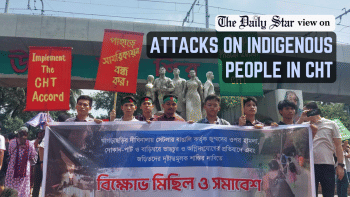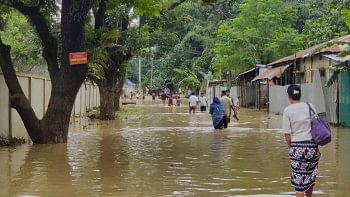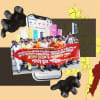Our demands are for inclusion, not separatism

The incident started with the mob beating of a person named Mohammad Mamum, who had allegedly stolen a motorcycle. He died from the beating. We do not condone such killings. Those who were involved in this incident should not have taken the law into their own hands. Instead, they should have handed him over to the police.
But when widespread attacks start based on such an incident, the following chain of events cannot be anything but planned. If the events that took place in the last month and a half were revisited and analysed, one can see there was a big rally on August 16 in Khagrachhari organised by students calling for unity. They called to end the divisiveness or differences of opinion among the various indigenous groups, which is a threat to our survival. No one had organised these students. They communicated amongst each other and organised it themselves.
A month later on September 18, they arranged yet another rally in Khagrachhari Sadar. This one was bigger and around 10,000-15,000 people participated in it. It was a peaceful rally and they presented an 8-point demand addressed to the chief adviser through the district commissioner, which called for peace in the Chittagong Hill Tracts. Now this disciplined and well-organised rally, without any vandalism, without anyone getting hurt, that saw the coming together of various Indigenous groups—Chakma, Marma, Tripura—was not well-received by many, in my opinion. There are quarters that want to sustain the divisiveness among us. They are used to seeing us fight among ourselves—they feel assured watching that. They do not feel comfortable when they see us united. These two rallies, organised by young people, within just one month, created a sense of panic among them. They cannot deny it. To steer the situation towards a different direction, the Dighinala incident was devised.
Previously, we had to believe whatever the press reported. Now, in the digital era, things have changed. If you watch the videos, you would see that during the confrontations between the Paharis and Bangalees, no group is attacking each other.
However, according to witnesses, security forces were present when the Dighinala Bazar was burnt down, but they did not prevent it from happening. For a long time, their presence was justified as something necessary for the security and peace of the people of the hill tracts. Where is that safety and security then if such violent incidents take place right in front of their eyes and they remain inactive? We do not need such security.
The propaganda that we want a separate state has been there for a long time. When the constitution was formed in 1972, MN Larma was an independent lawmaker and the only representative from the Chittagong Hill Tracts. When he raised the issue of recognising the Indigenous people in the constitution, his proposal was rejected and he was sidelined. If our rights were clearly recognised in the constitution at that time, then we would not have to pay for that mistake in today's Bangladesh.
Since then, many amendments to the constitution were made, and at last in the 15th amendment, we were included but only as tribes, minor races, ethnic sects, and communities. We are raising our voices and demanding to be included in the constitution. Are we doing this because we want separation?
The state called us separatists, people working in the previous governments called us separatists, and some groups called us separatists, but we want to be recognised in the constitution and live in this country as citizens. So, who is asking for a separate state? Not us. Through this propaganda, they are creating a negative image of us to execute their own plan. We do not want any separate state, like they have in India, or a separate country. We want to stay together and be included in the constitution. There's been discussion about constitutional reforms, we want our rights and our issues to be included in those reforms.
We appreciate that a strong team from the government has visited the areas today. We hope that they will be able to come up with ways to calm the situation and mitigate the anger, fear, and mistrust among the communities. Since our chief adviser won the Nobel prize for peace, we hope that he will take the initiative to reinstate peace in the hill tracts by fully implementing the CHT Peace Accord. The rest of the advisers are progressive-minded as well. So, we trust and hope that they will take this initiative together.
At the same time, we urge that the people who were actually involved in the fatal lynching of the alleged motorcycle thief, are identified and brought to book. Justice must also be served for the killing of the four people, whose deaths resulted from the communal riots in Dighinala, Khagrachhari, and Rangamati, which were instigated from the lynching incidents. If the July-August uprising killings can be investigated by a United Nations-led team, then why not these killings in the hill tracts? They should be investigated not just by a judicial body but also through the UN-body probing the killings in the plain land.
Ilira Dewan is a human rights activist.
Views expressed in this article are the author's own.
Follow The Daily Star Opinion on Facebook for the latest opinions, commentaries and analyses by experts and professionals. To contribute your article or letter to The Daily Star Opinion, see our guidelines for submission.

 For all latest news, follow The Daily Star's Google News channel.
For all latest news, follow The Daily Star's Google News channel. 







Comments